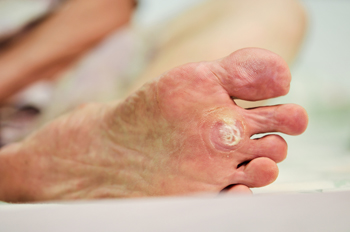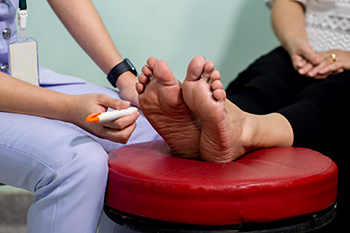April 2023
Facts About Plantar Warts

Plantar warts, also called verruca, are hardened growths that usually develop on the sole of the foot. They appear as rough, grainy, rounded lesions that may be covered by calluses and have tiny black dots. Plantar warts typically cause pain on the ball or heel of the foot, where they are most likely to form. This can affect both the way you stand and your gait, or the way you walk, which in turn can contribute to pain in other body parts. Because plantar warts are contagious, they can easily spread into clusters called mosaic warts. Plantar warts are caused by the human papillomavirus, or HPV, which usually enters through cracked dry skin or small cuts or sores on the feet. Children, teenagers, and people with weakened immune systems are particularly at risk of plantar wart infection. A plantar wart can take up to two years to go away on its own, and for that reason it is suggested that you see a podiatrist who can offer advanced treatment methods, including freezing off the warts and prescription medication.
Plantar warts can be very uncomfortable. If you need your feet checked, contact Dr. Scott Shrem from Garden State Foot & Ankle Center. Our doctor will assist you with all of your foot and ankle needs.
About Plantar Warts
Plantar warts are the result of HPV, or human papillomavirus, getting into open wounds on the feet. They are mostly found on the heels or balls of the feet.
While plantar warts are generally harmless, those experiencing excessive pain or those suffering from diabetes or a compromised immune system require immediate medical care. Plantar warts are easily diagnosed, usually through scraping off a bit of rough skin or by getting a biopsy.
Symptoms
- Lesions on the bottom of your feet, usually rough and grainy
- Hard or thick callused spots
- Wart seeds, which are small clotted blood vessels that look like little black spots
- Pain, discomfort, or tenderness of your feet when walking or standing
Treatment
- Freezing
- Electric tool removal
- Laser Treatment
- Topical Creams (prescription only)
- Over-the-counter medications
To help prevent developing plantar warts, avoid walking barefoot over abrasive surfaces that can cause cuts or wounds for HPV to get into. Avoiding direct contact with other warts, as well as not picking or rubbing existing warts, can help prevent the further spread of plantar warts. However, if you think you have developed plantar warts, speak to your podiatrist. He or she can diagnose the warts on your feet and recommend the appropriate treatment options.
If you have any questions please feel free to contact our office located in Hazlet, NJ . We offer the newest diagnostic and treatment technologies for all your foot and ankle needs.
How Is a Broken Foot Diagnosed?

A broken foot is a common injury that can happen from falling or if a heavy object falls on it. There is often no mistaking if the foot has been fractured, as it is generally accompanied by severe pain and discomfort. Additional symptoms can include tenderness in the overall foot, difficulty in walking or standing, and you may hear a cracking sound when it is moved. Having an X-ray performed is often an efficient method of obtaining a proper diagnosis, and this is effective in determining the severity of the fracture. Treatment is generally done by placing the affected foot in a boot or cast, and crutches may be necessary in keeping weight off of the foot as the healing process occurs. It is helpful to elevate the foot as often as possible, and specific stretches may need to be performed after it has healed. If you have broken your foot, it is suggested that you speak with a podiatrist as quickly as possible who can help you with proper treatment methods.
A broken foot requires immediate medical attention and treatment. If you need your feet checked, contact Dr. Scott Shrem from Garden State Foot & Ankle Center. Our doctor can provide the care you need to keep you pain-free and on your feet.
Broken Foot Causes, Symptoms, and Treatment
A broken foot is caused by one of the bones in the foot typically breaking when bended, crushed, or stretched beyond its natural capabilities. Usually the location of the fracture indicates how the break occurred, whether it was through an object, fall, or any other type of injury.
Common Symptoms of Broken Feet:
- Bruising
- Pain
- Redness
- Swelling
- Blue in color
- Numbness
- Cold
- Misshapen
- Cuts
- Deformities
Those that suspect they have a broken foot shoot seek urgent medical attention where a medical professional could diagnose the severity.
Treatment for broken bones varies depending on the cause, severity and location. Some will require the use of splints, casts or crutches while others could even involve surgery to repair the broken bones. Personal care includes the use of ice and keeping the foot stabilized and elevated.
If you have any questions please feel free to contact our office located in Hazlet, NJ . We offer the newest diagnostic and treatment technologies for all your foot and ankle needs.
Wounds That Don't Heal Need to Be Checked
Common Causes of Foot Pain

Almost everyone has felt some type of foot pain in their life, especially if they are physically active. However, foot pain also may be caused by genetics, diet, obesity, and infections. The most common causes of foot pain include bunions, hammertoes, and corns. Gout, flat feet, and plantar warts are other painful foot conditions. In addition, athlete’s foot, toenail fungus, and ingrown toenails are common foot pain complaints. Many of these conditions can be resolved by taking better care of the feet on a daily basis, as well as wearing shoes that fit the feet properly. Gout, however, is an inflammatory condition that results from having an excess of uric acid in the body. Omitting foods high in purines can help to prevent it. Infections are often transmitted in pool or gym locker rooms, with protective footwear they can be avoided. Caring for the toenails by cutting them properly may diminish the chances of an ingrown toenail. If you are experiencing foot pain that impedes your daily activities, it is suggested that you visit a podiatrist for help.
Foot Pain
Foot pain can be extremely painful and debilitating. If you have a foot pain, consult with Dr. Scott Shrem from Garden State Foot & Ankle Center. Our doctor will assess your condition and provide you with quality foot and ankle treatment.
Causes
Foot pain is a very broad condition that could be caused by one or more ailments. The most common include:
- Bunions
- Hammertoes
- Plantar Fasciitis
- Bone Spurs
- Corns
- Tarsal Tunnel Syndrome
- Ingrown Toenails
- Arthritis (such as Gout, Rheumatoid, and Osteoarthritis)
- Flat Feet
- Injury (from stress fractures, broken toe, foot, ankle, Achilles tendon ruptures, and sprains)
- And more
Diagnosis
To figure out the cause of foot pain, podiatrists utilize several different methods. This can range from simple visual inspections and sensation tests to X-rays and MRI scans. Prior medical history, family medical history, and any recent physical traumatic events will all be taken into consideration for a proper diagnosis.
Treatment
Treatment depends upon the cause of the foot pain. Whether it is resting, staying off the foot, or having surgery; podiatrists have a number of treatment options available for foot pain.
If you have any questions, please feel free to contact our office located in Hazlet, NJ . We offer the newest diagnostic and treatment technologies for all your foot care needs.
Foot Care Can Help to Prevent Diabetic Ulcers

Diabetics can be in danger of foot and toe problems as a result of sustained high blood sugar levels. Commonly, diabetes causes neuropathy in the lower extremities, which results in numbness and can put the patient in danger of developing a foot ulcer. Because the feeling in the feet is limited or absent, cuts, sores, and cracks in the skin may go unnoticed. Another underlying condition, called peripheral artery disease, can clog the blood vessels in the feet, making it more difficult for any such injuries to heal. This combination can lead to skin ulcers that if not attended to can cause gangrene. Experts suggest a daily foot care regime that can prevent ulcers from forming. It includes washing and drying the feet daily, inspecting them for sores, wearing shoes that are comfortable and fit well, and avoiding going barefoot. Keep the feet elevated when possible and perform light foot exercises, such as wiggling the toes and rotating the ankles to get the circulation going. If you have noticed a sore on your foot that is taking a long time to heal, it is suggested that you make an appointment with a podiatrist.
Diabetic foot care is important in preventing foot ailments such as ulcers. If you are suffering from diabetes or have any other concerns about your feet, contact Dr. Scott Shrem from Garden State Foot & Ankle Center. Our doctor can provide the care you need to keep you pain-free and on your feet.
Diabetic Foot Care
Diabetes affects millions of people every year. The condition can damage blood vessels in many parts of the body, especially the feet. Because of this, taking care of your feet is essential if you have diabetes, and having a podiatrist help monitor your foot health is highly recommended.
The Importance of Caring for Your Feet
- Routinely inspect your feet for bruises or sores.
- Wear socks that fit your feet comfortably.
- Wear comfortable shoes that provide adequate support.
Patients with diabetes should have their doctor monitor their blood levels, as blood sugar levels play such a huge role in diabetic care. Monitoring these levels on a regular basis is highly advised.
It is always best to inform your healthcare professional of any concerns you may have regarding your feet, especially for diabetic patients. Early treatment and routine foot examinations are keys to maintaining proper health, especially because severe complications can arise if proper treatment is not applied.
If you have any questions please feel free to contact our office located in Hazlet, NJ . We offer the newest diagnostic and treatment technologies for all your foot and ankle needs.
Blog Archives
- April 2025
- March 2025
- February 2025
- January 2025
- December 2024
- November 2024
- October 2024
- September 2024
- August 2024
- July 2024
- June 2024
- May 2024
- April 2024
- March 2024
- February 2024
- January 2024
- December 2023
- November 2023
- October 2023
- September 2023
- August 2023
- July 2023
- June 2023
- May 2023
- April 2023
- March 2023
- February 2023
- January 2023
- December 2022
- November 2022
- October 2022
- September 2022
- August 2022
- July 2022
- June 2022
- May 2022
- April 2022
- March 2022
- February 2022
- January 2022
- December 2021
- November 2021
- October 2021
- September 2021
- August 2021
- July 2021
- June 2021
- May 2021
- April 2021
- March 2021
- February 2021
- January 2021
- December 2020
- November 2020
- October 2020
- September 2020
- August 2020
- July 2020
- June 2020
- May 2020
- April 2020
- March 2020
- February 2020
- January 2020
- December 2019
- November 2019
- October 2019
- September 2019
- August 2019
- July 2019
- June 2019
- May 2019
- April 2019
- March 2019
- February 2019
- January 2019
- December 2018
- November 2018
- October 2018
- September 2018
- August 2018
- July 2018
- June 2018
- May 2018
- April 2018
- March 2018









